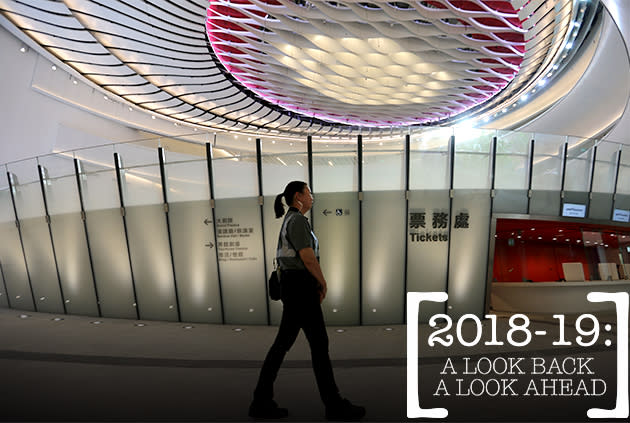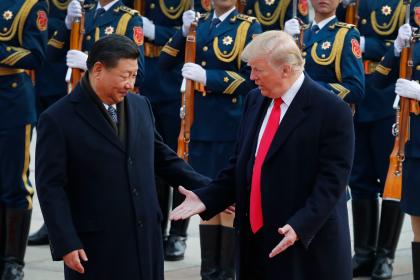China Box Office Growth Slows In 2018; Tricky Balancing Act Ahead For 2019

China box office for 2018 rose 9% over 2017, reaching RMB 60.98B ($8.87B), official figures now show. That’s a softer increase than the 13.5% we saw from 2016-2017, but is in keeping with the market’s target of RMB 60B. Although there was no single behemoth breakout like 2017’s Wolf Warrior 2, a handful of local titles did enviable business with homegrown movies accounting for 62% of the total in a year that saw the Hollywood studios pinched.
Up ahead, as ever with this confounding yet coveted market, there are questions looming. Amid an anticipated local production slowdown, the industry is left wondering how Chinese authorities will balance a potential shortage of homegrown titles against a tantalizing crop of Hollywood imports — all while maintaining a 50%+ cut of market share.
Among the local winners in 2018 were patriotic title Operation Red Sea ($576M and conveniently timed for February’s Chinese New Year period which fell just ahead of the 13th National People’s Congress), comedy sequel Detective Chinatown 2 ($541.4M) and black comedy/social drama Dying To Survive ($451M) which bucked a trend to spur debate on serious issues.
Hollywood titles were led by Avengers: Infinity War ($359.5M), Aquaman ($275.5M/still in release), Venom ($270M), Jurassic World: Fallen Kingdom ($261.2M) and Ready Player One ($218.5M). Still, an estimated 10% dip in Hollywood studio performance (in local currency) is partially blamed on the build-out of the Tier 4 and 5 cities whose audiences lean local.
But China knew it had a tough end of year with an absence of potential homegrown hits. So, through November and December it padded cinemas with Hollywood titles to boost figures. Overall, the Middle Kingdom in 2018 handed out more extensions than ever to well-performing films (including most recently Venom and Aquaman).
There is much concern on the horizon, however. China ramped up a crackdown on tax evasion within the entertainment business after the Fan Bingbing scandal when the megastar disappeared from public view only to resurface months later with a mea culpa and a hefty fine. In the wake of her woes, tax havens have been closed, regulators are keeping a keen eye on film companies, and the fear of audits is leading to a production slowdown. That means local product could dry up significantly this year, and that begs a question: In a drought, does China turn to Hollywood and increase the number of revenue-share movies it accepts?

Execs and China watchers are mixed on the potential outcome. Too many studio titles could mean the Middle Kingdom market share dips below 50% — and authorities are loath to see that happen, so could pull back on Western films. At the same time, they need to fill theaters with some 60K screens now across the market.
There is plenty of industry speculation that to keep the scales in the Middle Kingdom’s favor, there may be fewer Hollywood movies rubber-stamped this summer, and yet 2019 has a raft of films that would seem catnip to local audiences (think: Avengers: Engdame, Spider-Man: Far From Home, The Lion King, Fast & Furious Presents: Hobbs & Shaw, the list goes on).
One international distribution exec tells me, “Next year is going to be really tricky. It will be so hard to keep the ratio of Chinese films above Hollywood when there’s so much Hollywood product. There’s talk about not letting any Hollywood releases from mid-July until the end of October, but they may allow one or two in the end of August.” Another distribution maven wonders if China will reshuffle exhibitor requirements, issuing more onerous screen quota rules to ensure they make their numbers.
Complicating matters is the 70th anniversary of the founding of the People’s Republic on October 1 with the expectation that China may clear the cinema decks well before, lending credence to the speculation above. The same exec cautions, “China shot themselves in the foot a bunch of times (in 2018). They hardly released any Hollywood movies from the end of August to the end of October. Smallfoot and Predator are not exactly going to excite the market. If you want to grow, add movies that are exciting people.”
This person also believes the Chinese New Year period shouldn’t be so packed with local product that might have a chance elsewhere on the calendar. “If you’re not one of the potential Top 3 titles, why not release in July or September?”
There is already thought to be some movement on China’s part to ensure summer box office 2019 gets a boost rather than suffer from a dearth of product. The Mermaid 2, the sequel to the massive 2016 fantasy comedy, may be moving from Chinese New Year 2020 to July 2019. Detective Chinatown 3 could also be ready for summer.
Other titles to keep a lookout for in 2019 — which, to the executive above’s point, all fall during Chinese New Year — include the highly-anticipated The Wandering Earth along with Crazy Alien starring Hello Mr Billionaire‘s Teng Shen, who is also in racing-themed comedy Fast Life. Then there’s Jackie Chan-starrer The Knight Of Shadows, comedy sequel Some Like It Hot 2 and Stephen Chow’s The New King Of Comedy.
Also expected are the animated Peppa Pig feature and a new Boonie Bears installment as well as Hong Kong crime pic Integrity from Infernal Affairs‘ Alan Mak. China’s a huge market, but that’s an awful lot of movies to stack one on top of the other.
USC professor and China expert Stanley Rosen takes a more bullish view. He recently told me that despite a slowdown in production, China “will ensure that the patriotic blockbusters will continue to be made — and in fact Feng Xiaogang’s next film will be in that mold, it’ a good way for anyone under suspicion to show the authorities that their heart is in the right place.” He allows that “everything in China is flexible since China is trying to do many contradictory things at the same time,” but believes the fretting over a lack of local product next summer “will blow over. The need to expand the box office every year is too important to let it be derailed.”
While an 8% ticketing fee has helped goose figures over the past few years, it’s become standard accounting across the industry. However, let’s hope some dubious marketing methods employed to boost local pics this year do not constitute a trend. To wit: Back in August, iPartment took $44M on its first day, then plummeted. The film was an adaptation of novel The Lost Tomb, yet when its poster was released in May, it came with the title iPartment or Love Apartment and a look that resembled a similarly-titled TV series which is known as China’s answer to Friends. But the two properties were not connected, leading to much audience consternation. Ditto this past week’s Long Day’s Journey Into Night. The well-received Bi Gan Cannes pic was marketed as a must-see for couples on December 31 and did about $22M in presales, bowing on Monday to $38.4M. As auds realized this was not a mainstream offering, Tuesday’s box office dropped 96%. For an arthouse title, the haul is certainly impressive, but the journey to get there is questionable. (The movie will be released in the U.S. by Kino Lorber on April 12 and should be embraced by a solid arthouse crowd that knows what it’s getting.)

Meanwhile, talks between the USTR and China on a new film agreement remain at a stalemate following President Donald Trump’s trade tirade with the PROC. China has been a boon for Hollywood, which recoups 25% of box office with still manageable P&A costs (particularly as local companies like Tencent become marketing partners) but no ancillary, and the studios have long hoped a new deal would increase revenue splits.
Rosen offers a theory regarding the standoff on trade: “China is aware that bringing in more Hollywood films or giving Hollywood a higher percentage of box office receipts, or responding to Hollywood complaints about distribution issues will do nothing to appease Trump. In fact, it might even be counterproductive since the Trump administration could accuse China of avoiding the real problems in the relationship and the U.S. demands. China knows that Trump has an adversarial relationship with Hollywood.” There is currently no indication negotiations are gearing up any time soon.
Related stories
2018 Domestic Box Office Postmortem: What Went Right & Wrong For The Majors In A Record $11.9B+ Year
Apple Warns Investors Its Holiday Quarter Revenue Will Fall Short, Blames Slowing Economy In China
'Aquaman' Wields $600M+ Overseas, $823M WW; Now #2 Superhero Pic Ever In China
Get more from Deadline.com: Follow us on Twitter, Facebook, Newsletter
